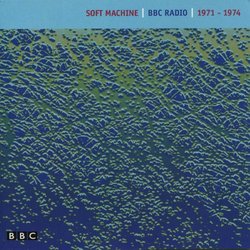Thank You BBC!
12/31/2003
(5 out of 5 stars)
"This double CD, the companion to BBC Radio 1967-1971, showcases the band at its jazziest. Consisting of "live" BBC studio versions of tunes found on the albums 5, Sixth, Seven, and Bundles, this collection is a must for all Soft Machine fans and lovers of great jazz fusion.
Phil Howard, whose short-lived career with the Softs was represented on just one side of their studio album "5", lays down some solid rythms on disc one, while Allan Holdsworth's guitar on disc two is, as always, superb."
The Fusion Evolution
R.Cittern | Springfield | 06/15/2005
(5 out of 5 stars)
"As the liner notes say this album certainly does show Soft Machine changing. The album is well produced and nicely packaged. Disc 1 starts us off with a hazy version of As If with Phil Howard going crazy on drums instead of John Marshall.Also different from the song is the echo sax by Elton Dean and no solo by Roy Babbington. Drop sound just like it does on Fifth not that much over dubbing on it. The unreleased Welcome To Frillsville is a long jam with Howard actually keeping a beat,the end product of the song is a lovely smooth jazz theme. Then we see Karl Jenkins and John Marshall in for Dean and Howard. The Melody features a great version of MC and Drop,All White is the same as the version on Six. Stanley Stamps is played with a synth in the backgound,pretty good too. And the starting of a great tune of Hazard Profile actually has a better lead on the beginning rift instead of those one line notes on the other Profile. Disc 2 has the Baritone Guitar solo of Babbington with turns into the relaxing recorder and sax lead of Down the Road still no Acostic Bass solo by Babbington. North Point is a cross between D.I.S and Four Gongs with some messy synth. The smoothness of The Man Who Waved at Trains also has Peff with out the guitar rift at the end. Then we go to the finale Hazard Profile which has a different middle part with out the organ lines being in charge on chord changes. And part 5 is in there but Ratlegdge's solo is on organ not a analog synth. If you got $30 (rip-off) go out and buy this masterpiece."


 Track Listings (6) - Disc #1
Track Listings (6) - Disc #1